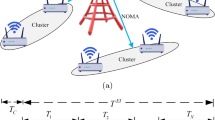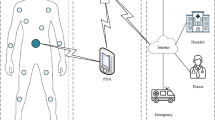Abstract
The basic timing structure for data exchange in WiMedia UWB MAC is a superframe composed of beacon period and data transfer period. When a new device joins the WiMedia UWB based network, the device has to send a beacon in a randomly selected beacon slot in the beacon period. Accordingly, when devices join or leave the WiMedia based network, they may result in idle beacon slots in the beacon period. The idle beacon slots should be removed to spare more time resources to the data transfer period, since no data exchange is permitted during the beacon period. This paper proposes an automatic beacon period contraction scheme which has objective of minimizing the waste of wireless resource in WiMedia UWB based home networks. The proposed method compresses the beacon period in a simpler and faster way than the conventional beacon period contraction algorithm defined in WiMedia MAC standard. Performance evaluation by computer simulation shows that the proposed scheme improves wireless channel utilization efficiency. The results of this paper can be applied to design and implementation of WiMedia MAC with small overhead for UWB applications.









Similar content being viewed by others
Abbreviations
- ABC:
-
Automatic beacon period contraction
- BP:
-
Beacon period
- BPOIE:
-
Beacon period occupancy information element
- CE:
-
Consumer electronics
- DTP:
-
Data transfer period
- HD:
-
High definition
- MAC:
-
Medium access control
- UWB:
-
Ultra wideband
References
Lee, J., Park, H., Lim, K., & Lee, K. (2008). Cross-layer design for fast TCP ACK-clocking over WiMedia UWB networks. IEEE Transactions on Consumer Electronics, 54(1), 52–57.
Joo, Y., & Hur, K. (2011). A conflict-avoided resource reservation using reservation diversity for UWB WPAN with distributed MAC protocol. Journal of Information and Communication Convergence Engineering, 9(4), 405–410.
WiMedia Alliance (2009). Distributed medium access control for wireless networks. MAC specification, release 1.5, Dec. 2009.
Wu, Q., Xiong, Y., Wu, H., Guo, Z., Xia, X.-G., Zhang, Q., et al. (2005). Performance evaluation of the beacon period contraction algorithm in UWB MBOA MAC. IEEE Communications Letters, 9(10), 933–935.
Goratti, L., Celentano, U., & Salokannel, J. (2006). Energy consumption of beacon period extension and contraction in distributed medium access control. In Proceedings of PIMRC.
Sun, S. (2007). Performance analysis of the beacon period contraction mechanism in WiMedia MAC for UWB. M.S. thesis, The University of Texas at Arlington, May 2007.
Acknowledgments
This research was supported by Basic Science Research Program through the National Research Foundation of Korea (NRF) funded by the Ministry of Science, ICT and Future Planning (2013R1A1A1008098) and in part by Basic Science Research Program through the National Research Foundation of Korea (NRF) funded by the Ministry of Education (2009-0093828).
Author information
Authors and Affiliations
Corresponding author
Rights and permissions
About this article
Cite this article
Seo, DH., Lee, S.R. & Joo, YI. Automatic Beacon Period Contraction for Energy Efficient WiMedia MAC. Wireless Pers Commun 80, 73–84 (2015). https://doi.org/10.1007/s11277-014-1995-5
Published:
Issue Date:
DOI: https://doi.org/10.1007/s11277-014-1995-5




